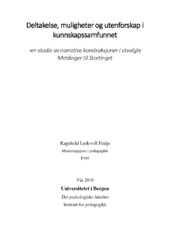| dc.contributor.author | Fedje, Ragnhild Leikvoll | |
| dc.date.accessioned | 2019-07-02T01:15:06Z | |
| dc.date.available | 2019-07-02T01:15:06Z | |
| dc.date.issued | 2019-07-02 | |
| dc.date.submitted | 2019-07-01T22:00:03Z | |
| dc.identifier.uri | https://hdl.handle.net/1956/20528 | |
| dc.description.abstract | Dette prosjektet undersøker hvordan narrative konstruksjoner av relasjonen mellom utdanning, arbeid og utenforskap kommer til uttrykk i utvalgte Meldinger til Stortinget. Disse er: St.meld. nr. 16 (2006-2007) …og ingen stod igjen. Tidlig innsats for livslang læring, St.meld. nr. 44 (2007-2008) Utdanningslinja, Meld. St. 16 (2015-2016) Fra utenforskap til ny sjanse og Meld. St 21 Lærelyst – tidlig innsats og kvalitet i skolen (Kunnskapsdepartementet). Oppgaven tar utgangspunkt i et konstruktivistisk perspektiv, og forskningsprosessen er basert på en narrativ analyse av de fire utdanningspolitiske dokumentene. Disse dokumentene har (med flere) lagt til grunn for Norsk kompetansepolitisk strategi 2017-2021 (Kompetanse Norge, 2017), og det er denne strategien som har gitt inspirasjon til masteroppgaven. Det teoretiske rammeverket er delt inn i to deler og organisert rundt hovedbegrepene narrativ, utdanning, arbeid og utenforskap. Den narrative tilnærmingen er både del av det teoretiske rammeverket og danner grunnlaget for den metodiske tilnærmingen. Det teoretiske rammeverket belyser også ulike perspektiver på forholdet mellom utdanning og arbeid, og forholdet mellom utdanning, samfunn og individ. Sosial utjevning, likhet, rettferdighet, formålet med utdanning, språk og identitet er sentrale begreper i rammeverket. Formålet med prosjektet er å belyse hva som kjennetegner de narrative konstruksjonene i fire Meldinger til Stortinget, diskutere de utdanningspolitiske føringene som kommer til utrykk gjennom de narrative konstruksjonene, og å sette søkelys på noen implikasjoner konstruksjonene kan ha for personer og grupper. Hovedtendensene i funnene viser et dikotomisk forhold mellom deltakelse i arbeids- og samfunnsliv og det å stå utenfor arbeids- og samfunnsliv, og mellom samfunnsansvar eller ansvar på individnivå å sørge for deltakelse og å forhindre at man står utenfor. På tvers av de fire Meldingene til Stortinget kommer det fram en overordnet, ideologisk og kulturell fortelling om behov og krav til kunnskap og kompetanse i «Kunnskapsnasjonen Norge». Dette metanarrativet har fått navnet ‘Kunnskapsnasjonen’. Hovedtendensene i materialet peker på grunnleggende utdanningsfilosofiske problemstillinger om hva som er formålet med utdanningen og utdanningens innhold, og om det gode for samfunnet versus det gode for individet i ‘Kunnskapsnasjonen. | en_US |
| dc.description.abstract | This project examines how narrative constructions of the relationship between education, work and ‘utenforskap’ (exclusion) are expressed in four White Papers. These are St.meld. nr. 16 (2006-2007) …og ingen stod igjen and Tidlig innsats for livslang læring and St.meld. nr. 44 (2007-2008) Utdanningslinja, and Meld. St. 16 (2015-2016) Fra utenforskap til ny sjanse and Meld. St 21 Lærelyst – tidlig innsats og kvalitet i skolen (Kunnskapsdepartementet). The thesis takes a constructivist perspective, and the research process is based on a narrative analysis of the four educational policy documents. These documents (amongst others) are the background for a Norwegian policy strategy on competance, Norsk kompetansepolitisk strategi 2017-2021 (Kompetanse Norge, 2017), and this strategy is the inspiration for this master thesis. The teoretical framwork is organized around the main concepts narrative, education, work and ‘utenforskap’. The narrative approach is both part of the methodical approach and the teoretical framework. The teoretical framework also focuses on the relationship between education and work, and the relationship between education, society and individuals. Equalization of social differences, equality, fairness, the purpose of education, language and identity are key concepts in the framework. This project aims to shed light on what characterizes the narrative constructions in the chosen White Papers, to discuss the guidelines of educational policy which are both implisitly and explisitly expressed through narrative constructions, and to question the implications these constructions might have on people and groups. The main tendencies in the findings shows a dichotomy between the taking part of the working- and society life and to be on the outside of work and society, and a tension between whether it is society’s responsability to make sure that people take part in and participate in society and work or if the responsibility solely lies on the individuals themselves. Throughout the four White Papers, an overarching, ideological and cultural narrative about the needs and demands for knowledge in a knowledgeintensive society appears. This metanarrative is given the name ‘Kunnskapsnasjonen’ (the knowledge nation). The main tendencies points towards basic educational philosophical issues about the purpose of education, what is good for society and for individuals in ‘Kunnskapsnasjonen’. | en_US |
| dc.language.iso | nob | |
| dc.publisher | The University of Bergen | |
| dc.subject | arbeid | |
| dc.subject | Narrativ | |
| dc.subject | utdanningspolitikk | |
| dc.subject | kunnskapssamfunnet | |
| dc.subject | utdanningsfilosofi | |
| dc.subject | utdanning | |
| dc.subject | utenforskap | |
| dc.title | Deltakelse, muligheter og utenforskap i kunnskapssamfunnet -en studie av narrative konstruksjoner i utvalgte Meldinger til Stortinget | |
| dc.type | Master thesis | |
| dc.date.updated | 2019-07-01T22:00:03Z | |
| dc.rights.holder | Copyright the Author. All rights reserved | |
| dc.description.degree | Masteroppgave i pedagogikk | |
| dc.description.localcode | PED395 | |
| dc.description.localcode | MAPS-PED | |
| dc.subject.nus | 724112 | |
| fs.subjectcode | PED395 | |
| fs.unitcode | 17-42-0 | |
